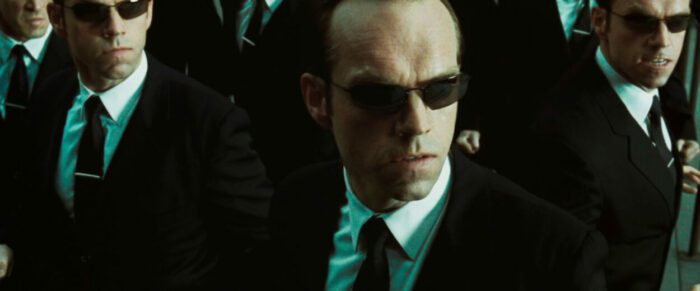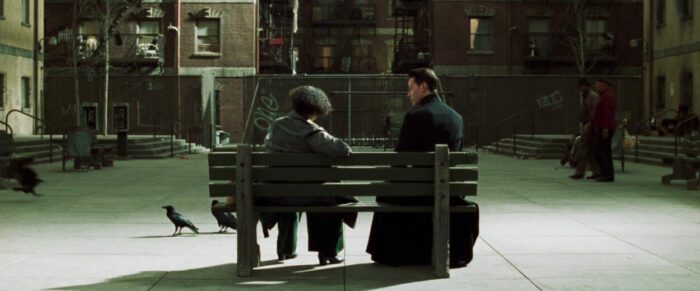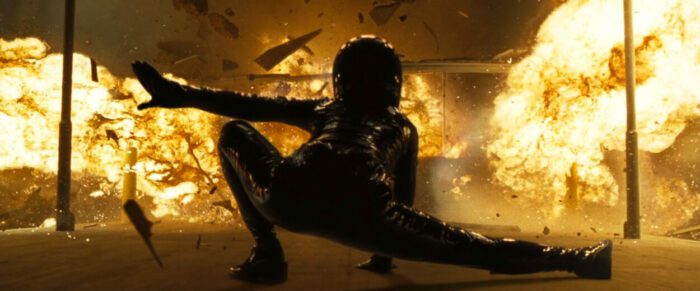Choice. This is about choice.
—Neo to The Architect
Twenty years ago, I was so excited to see The Matrix Reloaded. When I first saw that teaser trailer attached to Star Wars: Episode II – Attack of the Clones the year before, the countdown began. I read everything I could about the upcoming Matrix sequels, soaked up everything piece of marketing, bought a ticket to Dreamcatcher just so I could see the animated prequel short “Final Flight of the Osiris,” and bought both the soundtrack for The Matrix Reloaded and the DVD for The Animatrix.
The Matrix Reloaded was my number one anticipated film for the 2003 summer movie season. As per usual, I went with my brother to see it on opening weekend. We loved it, but I’m certain I loved it more. Even the issues I had with the film couldn’t waver my opinion, because I ultimately understood the choices the Wachowski Sisters made.
I’ve seen the film several times over the past 20 years, the last time very recently. Does it still hold up for me? Yes, it does. Of course, it isn’t perfect.
The CG-Smiths during that otherwise magnificent fight in the middle of the movie aren’t great, but the scene itself still works for me. The concept of the scene is terrific. Smith is now the literal virus he claimed humanity was in the first film—taking over other programs, as well as human minds, in the matrix and spreading. Seeing Neo fight multiple Smiths is exciting and impressive for the first two minutes, but then it becomes overkill.
The scene isn’t ruined by the overuse of CGI, but I believe it would’ve worked just as well had it been shorter. And if it had been shorter, less CGI would’ve been necessary. Now, don’t get me wrong. I’m not someone who complains about too much CGI or even bad CGI. It’s here to stay, and as long as it feels like it belongs in a scene or sequence, I don’t have an issue with any of it. My issue with the CGI in a scene like this, though, is that it wasn’t needed at a certain point. I mean, I don’t need to see CG Neo jumping from CG-Smith’s head to CG-Smith’s head.

However, I love the scene overall. It reminds me of the “rave scene” in the first act. I don’t have an issue with the idea of it. I like that Morpheus is reassuring everyone, and I like the motivation for dancing. It’s like, “Screw the machines. We’re not afraid.” Still, it’s a bit too long.
Oddly enough, whether one believes the philosophy of the film is superficial, it works tonally and thematically for me. Whether it’s coming from The Oracle, The Merovingian, or Councilor Hamann, I dig it. I always have.
The first Matrix film was primarily about Neo understanding that he was the One. As The Oracle would say, he was always the One. He just needed to understand that. It’s one thing to be told something. It’s another to understand it. The Matrix was about learning. The Matrix Reloaded is about comprehending.
To truly know, one must question. It can be difficult to question certain aspects of life, though, particularly the parts of it that bring us happiness and comfort, like family, friends, or romantic partners. Neo was told certain things by Morpheus and The Oracle in the first film. Now, he’s being told that things are a bit more complicated. Yes, Neo is the One, but he’s not the first One. Yes, Morpheus is right to have his faith, but his faith is tied to powers that have long ago taken away his and everyone else’s choices.
Free will does not fully exist in The Matrix films. This, of course, should come as no surprise given The Oracle. How can you have someone like her and still think free will exists? The Matrix Reloaded introduces a fascinating concept to the series in this exchange between Neo and The Oracle:
ORACLE: So it’s really up to you. You just have to make up your own damn mind to either accept what I’m going to tell you or reject it. Candy?
NEO: You already know if I’m going to take it?
ORACLE: Wouldn’t be much of an Oracle if I didn’t.
NEO: But if you already know, how can I make a choice?
ORACLE: Because you didn’t come here to make the choice, you’ve already made it. You’re here to try to understand why you made it.
It seems that knowledge is power (as we certainly see in the third and final film of the original trilogy), but understanding is everything. Neo is meant to do what he’s meant to do. The Oracle knows this, but she’s also gambling on the fact that Neo will comprehend not only what he has to do but why he has to do it. It’s a pretty esoteric plot point, and I get why audiences could get turned off by talk like this in the first half of the film.
It’s like, “Hey, Oracle. Just tell Neo everything and what he has to do.” However, the Wachowski Sisters are telling their story a particular way, and I applaud them for it. They recognize the issue with education. As I stated before, being told something is just not enough. Neo must continue his journey on his own.

That said, before Neo can get a chance to understand his choices, he comes across a few others who have ideas of their own. The first is Smith, who confronts Neo immediately after his conversation with The Oracle, talking about being free. The interesting thing about Smith’s point of view is that in order for him to be free he must have purpose. He recognizes that unless he controls the matrix, he can never be free. His choices will never be his own. Might as well take over. What happens next? That’s for the next film.
As for The Merovingian, his stock-in-trade concerns information. Because of this, his conclusion regarding the nature of the universe is that everything is just cause and effect. Honestly, all douchiness aside, he’s correct. His point is that no one can be free if their very existence is the result of something that came before. Neo can’t be free because, well, he’ll find out soon enough.
The Architect scene remains one of the highlights of The Matrix Reloaded, followed by that incredible freeway chase that is over-the-top insanity which, after all these years, still gets me grinning ear to ear. Now, the scene with The Architect is criticized as being over-explanatory and overly written. I have a few things to say about that.
Regarding the former, I accept that most viewers believe storytelling shouldn’t be bogged down with exposition. Further, it makes sense to me that a visual medium such as film showing rather than telling is the choice filmmakers should make. However, personally speaking, I love this scene because it involves a powerful character telling the hero (and by extension the audience) a bunch of information. The first time I watched the film, I was glued to the screen. I remember leaning in, completely enraptured at The Architect’s revelation that Neo was not the first One, nor was he the second or third.
I don’t need to see this information. Having someone say it is great to me. I love exposition. And as for the rhetoric used by The Architect, it makes sense to me. The guy (or avatar for a machine in the real world, maybe?) is cold and logical. Of course, he’d use fancy and pretentious words. He’s the opposite of The Oracle who, despite her mysterious word choice at times, speaks so that others can understand her easily.
The Architect wants Neo to understand that choice really isn’t real. As it turns out, in varying degrees, The Oracle, Smith, and The Merovingian were all correct. There is no free will. The machines are in control. However, by understanding the choices put forth by the machines, Neo can escape this loop of not only becoming the One but ultimately letting the machines destroy Zion before allowing a few remaining humans to restart again.
If modern storytelling tells us anything it’s that putting one person above the rest is something the hero can do without missing a step. Neo chooses to save Trinity rather than follow the journey of previous versions of the One, but The Architect is unfazed. Zion will fall regardless. Neo can have what appears to be his choice, but if said choice doesn’t change the bigger picture of Zion falling, does his choice mean anything to the machines?
Is Neo’s choice to choose Trinity something the machines foresaw? What about Smith slowly taking over the matrix? Also, The Oracle is a program from the machine world, but she doesn’t seem to be on the machines’ side, so what is she up to?

The Matrix Reloaded ends with what felt to me at the time a doozy of a cliffhanger. Knowing where things go with The Matrix Revolutions, the ending isn’t all that strong to me anymore. Neo stops a bunch of sentinels in the real world and then enters a coma. Meanwhile, Smith has figured out a way to enter into a human’s mind in the matrix and then stay there when the body exits back into the real world.
The possibilities of where The Matrix Revolutions was headed were abundant that summer. Those questions above were nothing compared to the kind of theories I, my brother, or people online had regarding the end of the trilogy. Was the so-called real world actually another level of the matrix? Maybe Neo was a program. Maybe, maybe, maybe. Only time would tell.
There’s something admirable about taking the fundamental ideas from The Matrix and then deconstructing them in the sequel. Not to mention the audacity of the Wachowski Sisters to really use their artistic freedoms in this film to make some bold choices. I mean, that orgasm-cake moment in the middle of what was a major summer studio release? Insane.
I love the action, the effects (for the most part), the music, and most certainly the philosophy, however superficial it might seem. I appreciate that Neo’s status as the chosen one was obliterated and that he chose Trinity instead of doing what past versions of the One did. But I could go on.
Ultimately, I love The Matrix Reloaded, and it’s a damn shame I’m in the minority. That said, sometimes it’s okay to love something others don’t. It allows me to believe that I do have the choice to do so, and after critically thinking about that choice, I get to understand why I love it, too.




